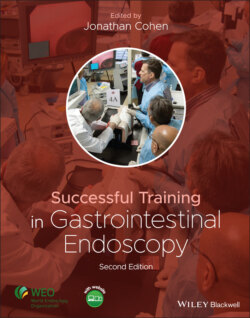Читать книгу Successful Training in Gastrointestinal Endoscopy - Группа авторов - Страница 140
Early cognitive skills
ОглавлениеBefore hands‐on endoscopy training begins, trainees need to undergo a curriculum that ensures the early cognitive skills (anatomy, preparation, scope selection, sedation, and indications/contraindications) have been acquired. Like many other aspects of endoscopy, training has been traditionally accomplished at the bedside under direct supervision. Cognitive skills however have been learned entirely “on‐the‐job.” In fact, it is likely of greatest benefit to us and our patients to have the bulk of these cognitive skills learned prior to introduction to the endoscopy suite. This will save valuable teaching time and make the teaching experience more meaningful for the trainee and teacher alike. For all of the specific early cognitive skills outlined, each can be generally be achieved through multiple instructional media, including endoscopic atlases, textbooks, and pertinent journal articles such as professional society practice guidelines. Common to all is that these methods are primarily “self‐directed” learning tools. The trainee only needs ready access and guidance as to what materials are most pertinent to ensure all cognitive skills are covered and that the materials are of appropriate quality. This is best accomplished by assigning trainees a curriculum of required material that cover intended topics and learning goals. The rest is done as self‐study. Didactic lectures can also be included to augment these learning materials. Ideally, training programs should have new fellows undergo a series of “Core Endoscopy Lectures” during the first 2 months of fellowship in addition to their required self‐directed learning materials. Each lecture to focus on one of the core cognitive competencies. Lectures or discussion groups can ensure that students have the opportunity to ask questions and clarify misunderstandings that may arise from their self‐directed learning. When trainees participate in interactive sessions, these didactic discussions can also allow for formative assessments of the trainees' fund of knowledge.
Assessment is the other important half of any educational endeavor but is the one often neglected. For cognitive skills in general, the use of brief written exams can be an easy means to reliably and objectively measure the acquisition of these skills. As with any assessment, these can be used as self‐assessment exams for feedback (formative assessment) or as higher‐stakes exams that must be passed prior to advancing to patient‐based practice (summative assessment). Regardless how an institution uses the assessment, it should be carried out to ensure the learning goals of a curriculum are being met. Both education and assessment goals can be met through the use of computer multimedia tools where self‐assessment quizzes can be linked directly to the learning material and provide real‐time feedback on areas where the trainee may have answered incorrectly.
Sedation skills are unique in that simulation training can also be effectively employed to augment the other self‐directed learning tools. Much of sedation training involves airway management taught to all medical students in basic and advanced life support courses. Even as fellows, these skills should be renewed periodically based on American Heart Association recommendations and endoscopy training programs should ensure that these skills or equivalent training is up to date. The use of airway and anesthesia mannequins can help teach the skills of basic airway management, monitoring, titration of medications, and management of sedation complications such as the appropriate use of reversal agents. These simulation tools can also be used for skills assessment where trainees must be able to demonstrate adequate ability in the management of these various sedation skills. Which specific modalities an institution uses for early cognitive training will depend largely on the resources available. Whichever are used, however, a concerted effort should be made to ensure these basic skills are taught prior to initiating patient‐based training, and some form of assessment (even if informal formative feedback) is used and documented as part of the fellows training folder.
